Spring 2025
PHIL 1101 - Introduction to Philosophy (multiple sections)
Course Description
Introduction to critical exploration of such issues as knowledge, reality, consciousness
and the good life; readings from Plato, Descartes, Kant, Nietzsche, or more recent
sources.
PHIL 1102 - Introduction to Ethics (multiple sections; online courses available)
Course Description
Introduction to such social and ethical questions as, “What makes a happy life? What
justifies ideas of good and evil? How should we live with others? What is the role
of gender and race in society?” The subjects of justice, racism, and oppression, especially
as they figure into the American context, are highlighted.
PHIL 1611 - Elementary Logic (multiple sections; online courses available)
Course Description
In this course we will cover topics in both formal and informal logic. Studying logic
trains the mind to reason well. Logic has played a foundational role in education
for over two thousand years because reasoning well is essential to any intellectual
endeavor, whether it be in the sciences, the arts, or the humanities. We will explore
everyday uses of logic, historical systems of formal reasoning, and some modern formal
logic.
Required Textbook (M50 online versions; always consult your syllabus or instructor
before purchasing textbooks)
MindTapV2.0 for Hurley/Watson's A Concise Introduction Logic, 1 term Printed Access Card. 2019. ISBN: 9780357419410
PHIL 3002 - History of Modern Philosophy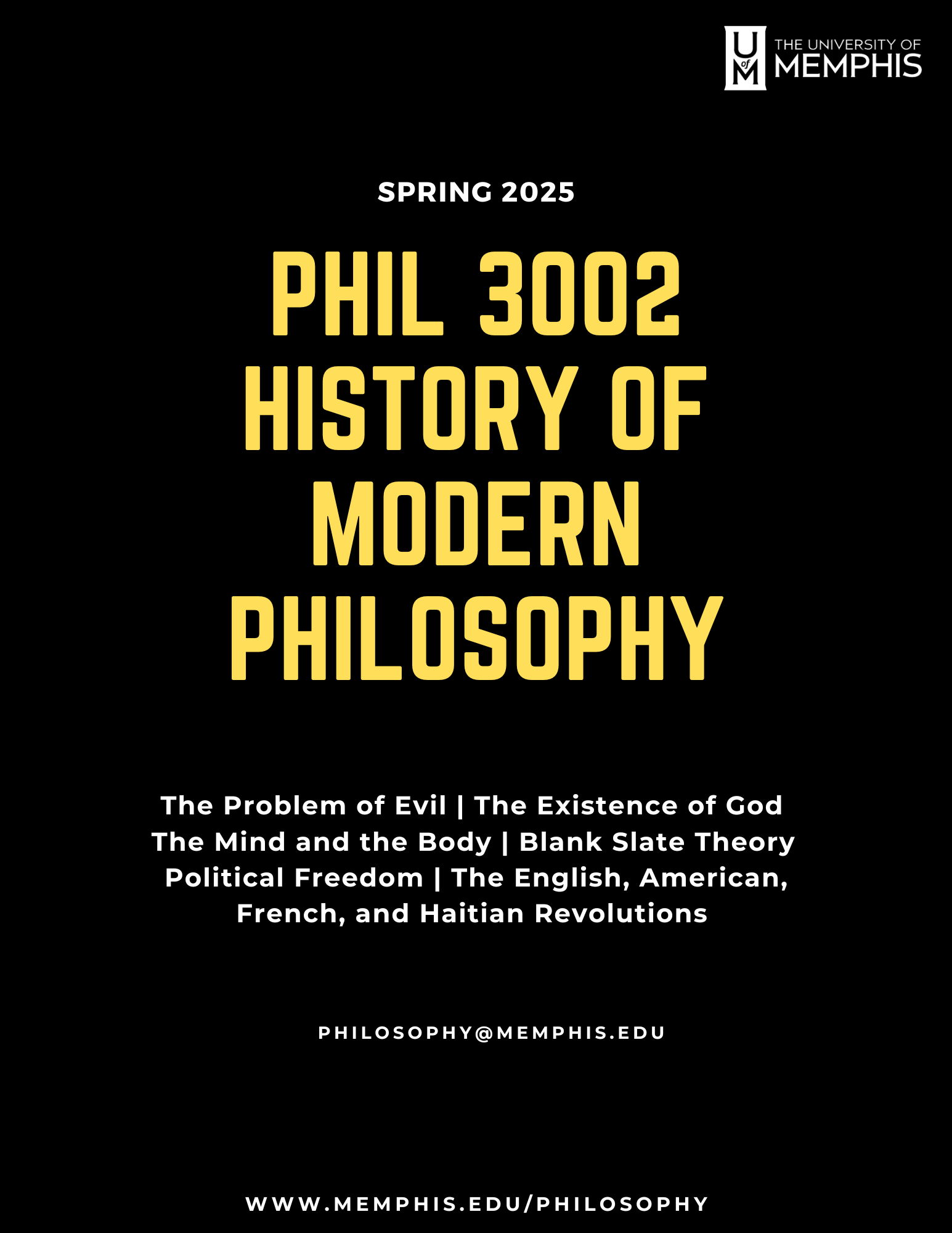 CRN 12088
CRN 12088
TR
11:20 - 12:45am
Daniel Smith
Course Description
This course will provide students with an overview of the major figures and topics
of early modern philosophy. Philosophers in this period were responding to dramatic
changes that were taking place in European society and culture stemming from the “scientific
revolution”, and the main themes and concerns of their work emerge from this context.
In the first half of the class, we will discuss topics in metaphysics and epistemology
such as the nature of causality, the existence of God, the relation between mind and
body, and the problem of evil.
Many of the philosophers we will have read in the first half were also influential political theorists. Modern philosophy coincides with the “age of revolutions” in which the modern political world as we know it was formed. The ideas we will study in the second half of the class had a profound impact on social upheavals taking place in England, the United States, France, and Haiti. Alongside canonical writings in political philosophy, we will read key texts from these four revolutions that were directly inspired by them, including manifestoes, constitutions, declarations of independence, and some famous political speeches.
PHIL 3411-M50 - Contemporary Moral Problems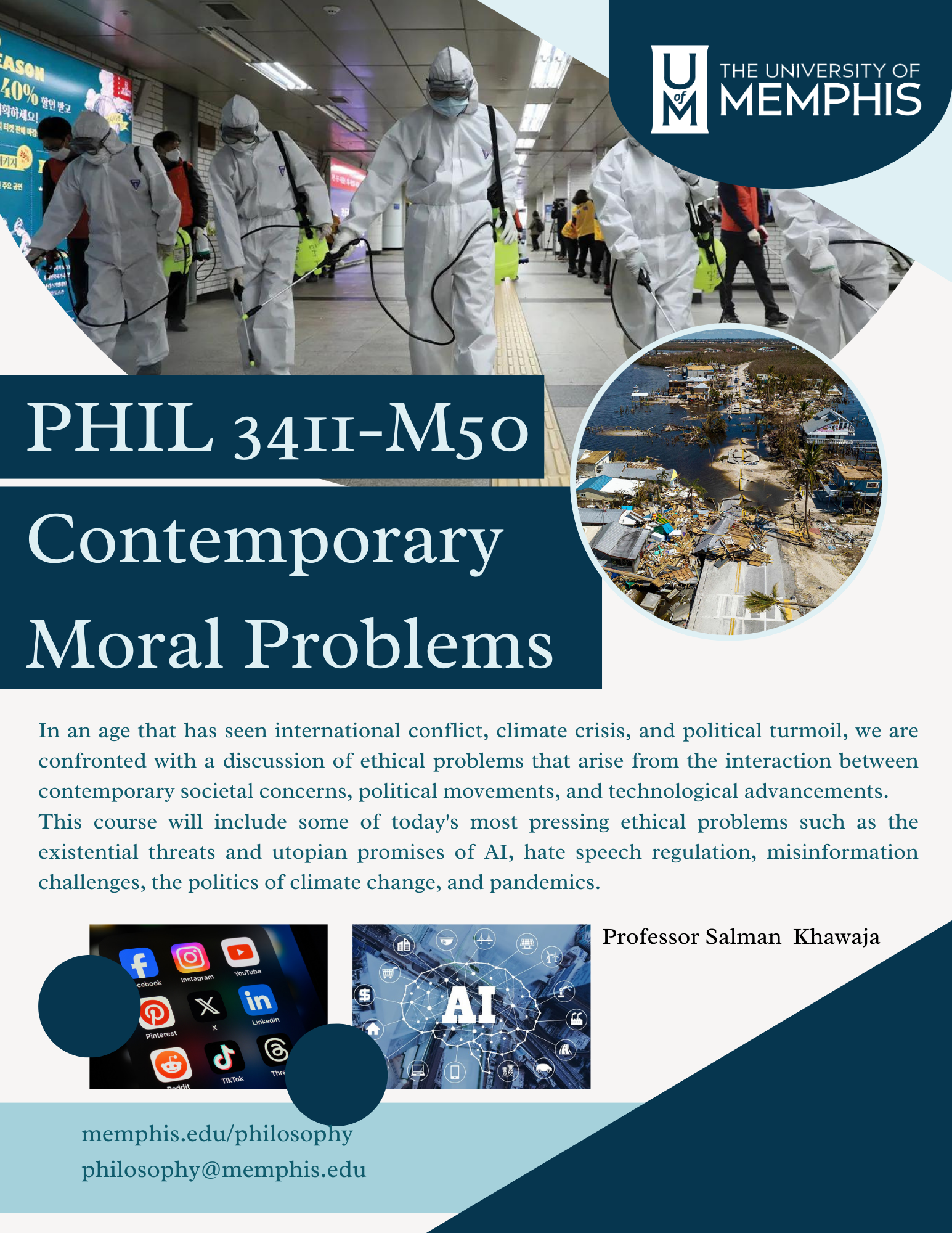
CRN 21390
Online
Salman Khawaja
Course Description
Discussion of ethical problems that arise from the interaction between contemporary societal concerns, political movements, and technological advancements.
This course will include some of today's most pressing ethical problems such as the existential threats and utopian promises of AI, hate speech regulation, misinformation challenges, the politics of climate change, and pandemics.
PHIL 3514 - Biomedical Ethics (multiple sections; online courses available)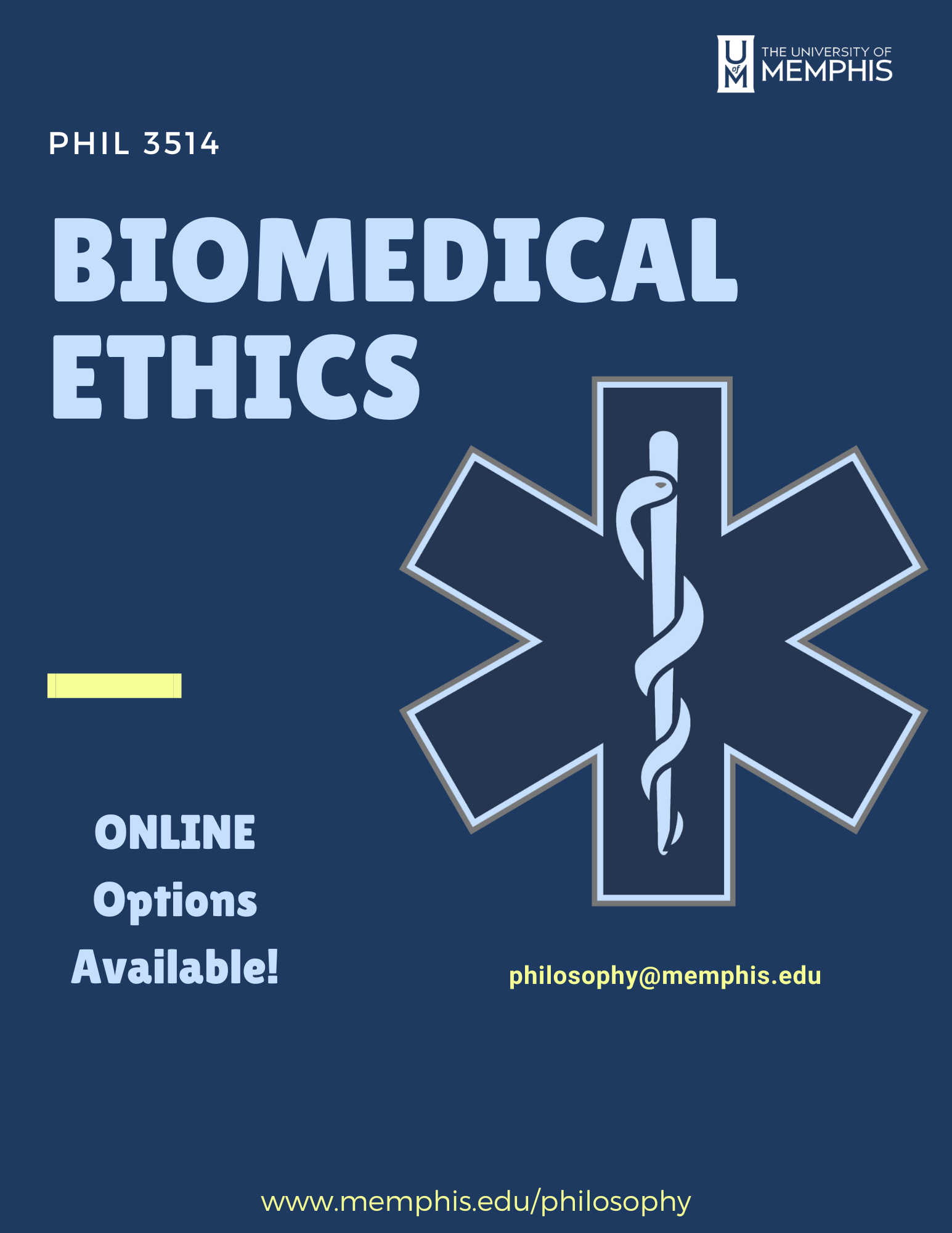
Course Description
Discussion of ethical problems raised by contemporary medical practices and biological
innovations from standpoint of contemporary ethical theories including abortion, euthanasia,
human experimentation and genetic engineering.
Course Description (M50 online versions)
In this course we will begin by learning about moral theory, logic/argumentation,
and concepts related to biomedical ethics such as autonomy, paternalism, informed
consent, and more. We will then explore case studies in the modules that follow. Such
topics include human research, pandemic ethics, abortion, euthanasia, and health care.
You will be expected to apply moral theory to cases studies as well as identify relevant
concepts.
Required Textbooks (M50 online versions; always consult your syllabus or instructor
before purchasing textbooks)
Bioethics: Principles, Issues, and Cases by Lewis Vaughn (multiple editions available)
PHIL 3515 - Climate Change, Ethics, and Environment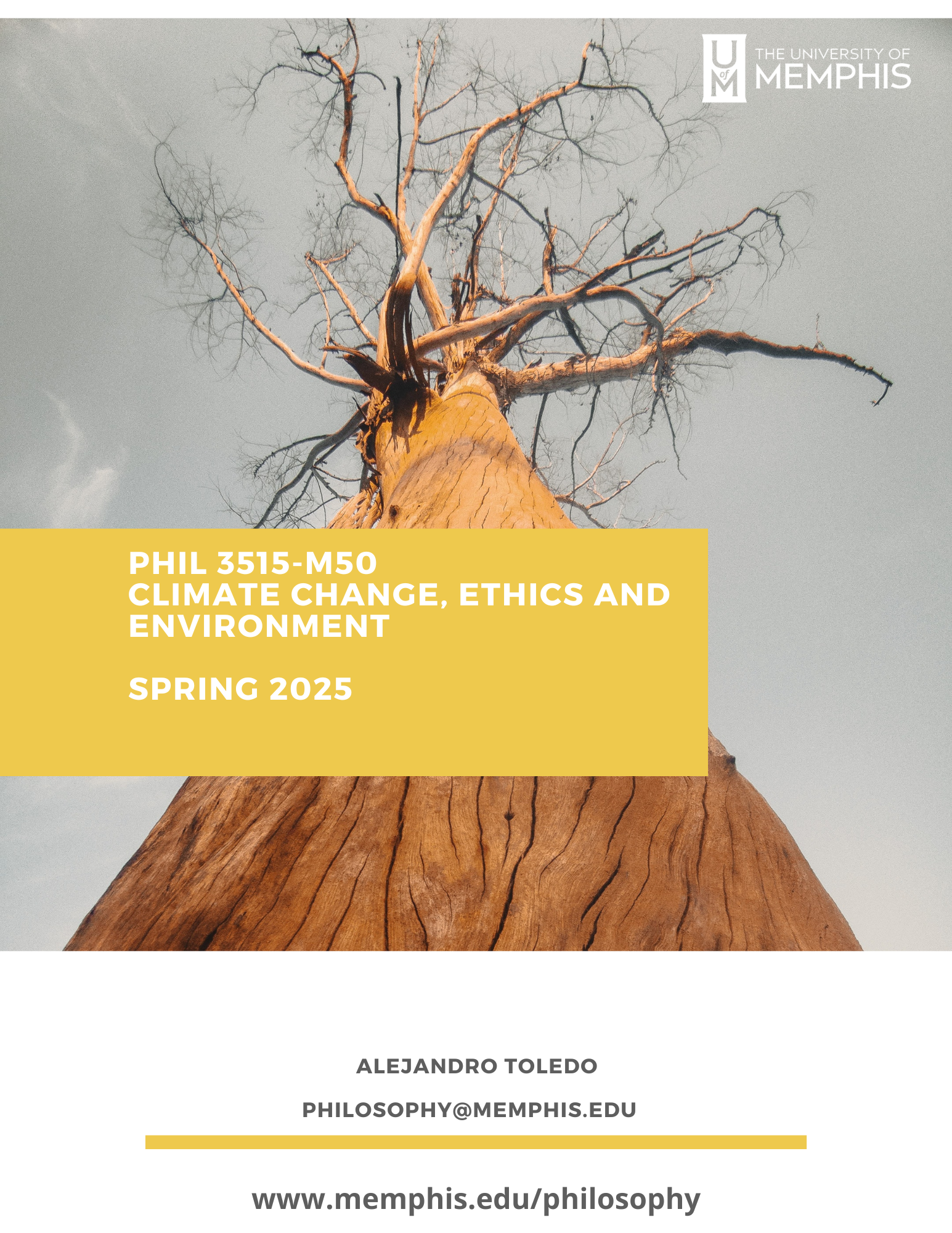
CRN 22050
ONLINE
Course Description
Most agree that we should treat people with respect and concern. In other words, we
should treat people ethically. But why should this ethical treatment extend to non-human
features of our world like oceans, forests, and non-human animals? This course will
investigate the sources of our ethical commitments to the environment with a special
focus on the effects of climate change and our obligations to reduce global warming.
Attention will also be paid to distinct ethical problems like those concerning animals,
biodiversity, sustainable energy, and environmental racism.
PHIL 3621 - Formal Logic 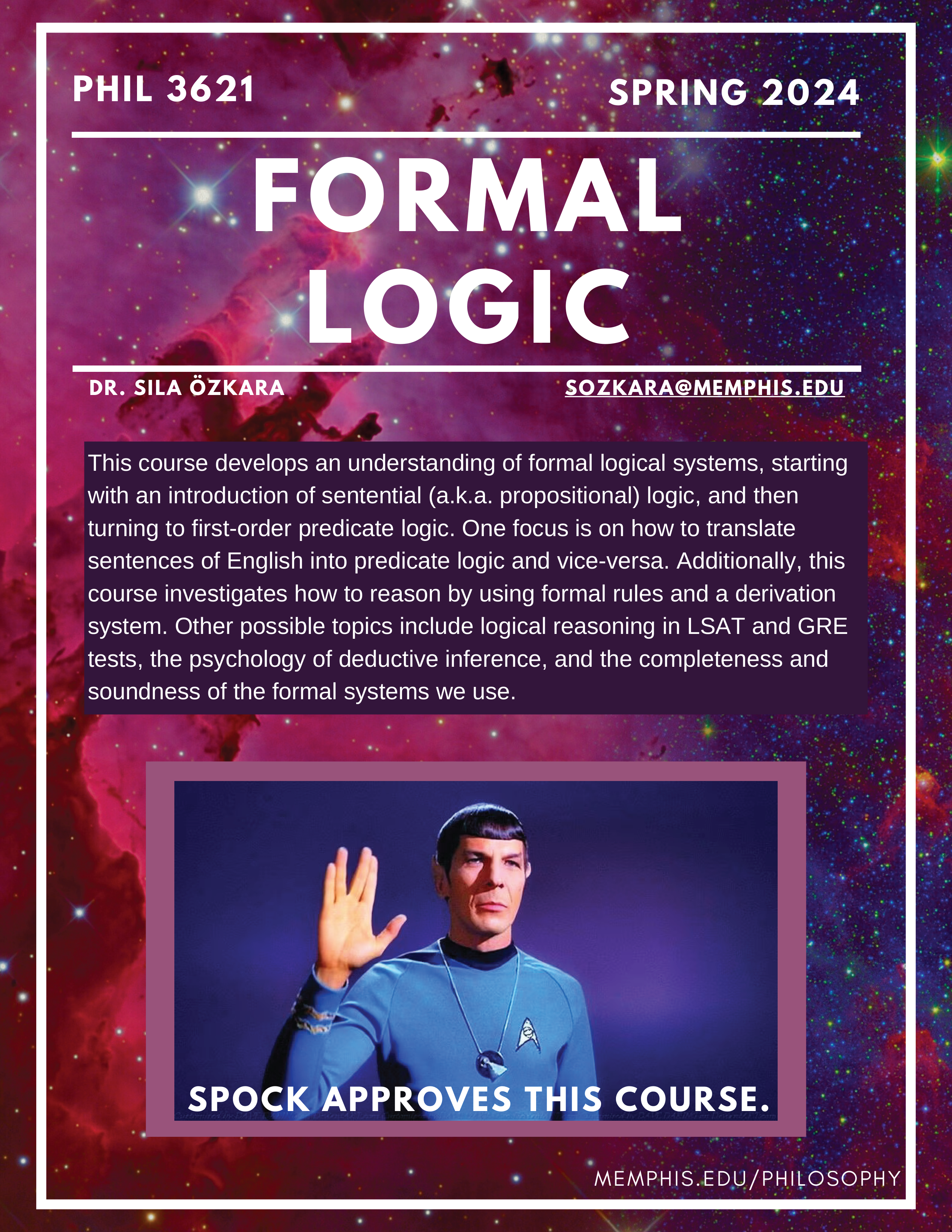
CRN 24353
TR
9:40-11:05am
Sıla Özkara
Course Description
This course develops an understanding of formal logical systems, starting with an
introduction of sentential (a.k.a. propositional) logic, and then turning to first-order
predicate logic. One focus is on how to translate sentences of English into predicate
logic and vice-versa. Additionally, this course investigates how to reason by using
formal rules and a derivation system. Other possible topics include logical reasoning
in LSAT and GRE tests, the psychology of deductive inference, and the completeness
and soundness of the formal systems we use. While there are no prerequisites for this
course, some training in, or familiarity with the use of formal reasoning as taught
in elementary logic, computer science, or mathematics has proven helpful to students.
PHIL 3722 - Buddhist Philosophy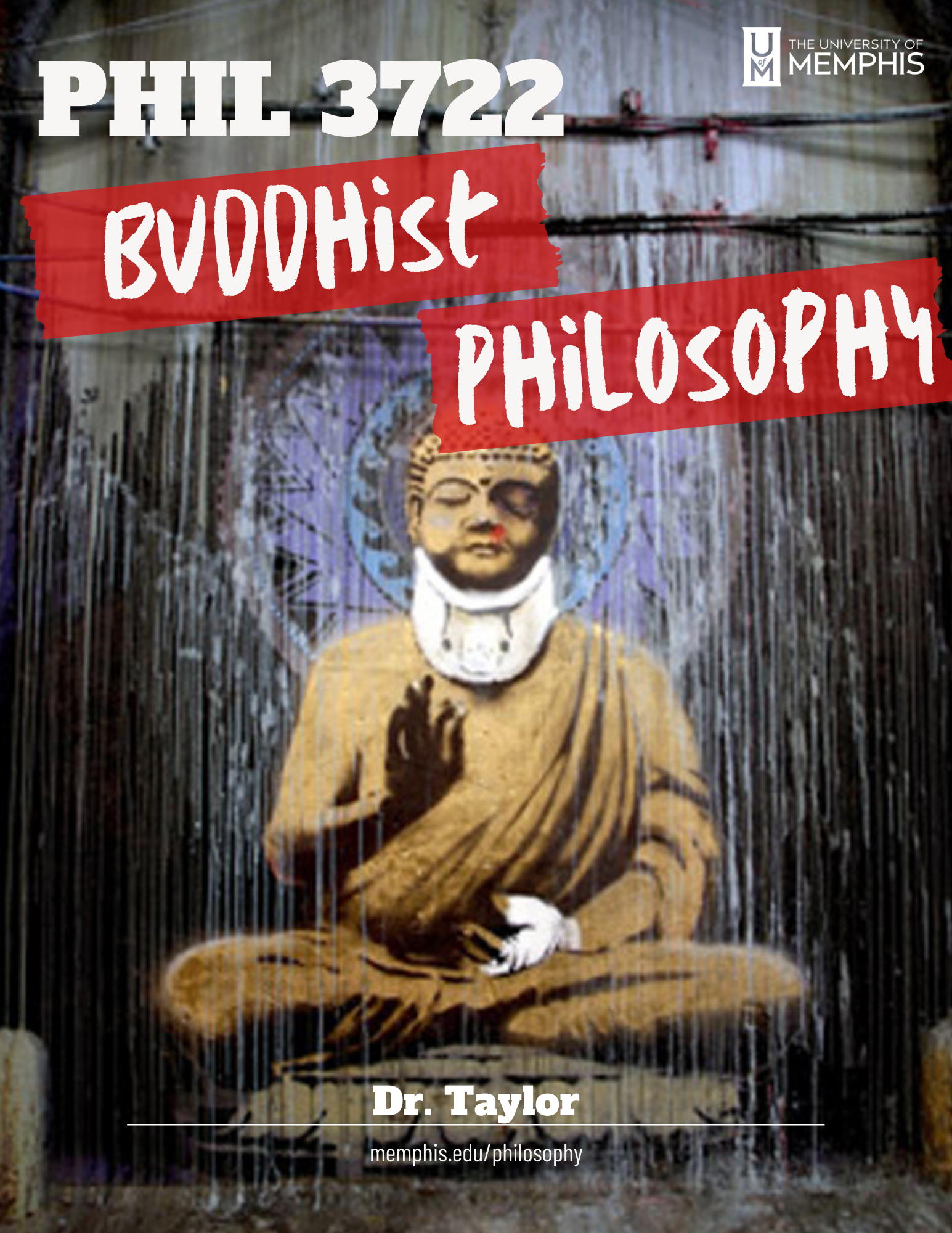
CRN 30080
TR
9:40-11:05am
Kevin Taylor
Course Description
This course will explore Buddhist philosophy in its Indian origins of no-self and the role of mindfulness in the eightfold path and in Buddhist meditation, Zen developments with an attention to emptiness and mindfulness meditations, and contemporary approaches to the popularization of mindfulness.
Figures to be studied include Siddhartha Gautama, Nagarjuna, Huineng, Linji, Saigyō, Dōgen, Takuan Sōhō, and Hakuin Ekaku.
PHIL 3781 - Philosophy and Film 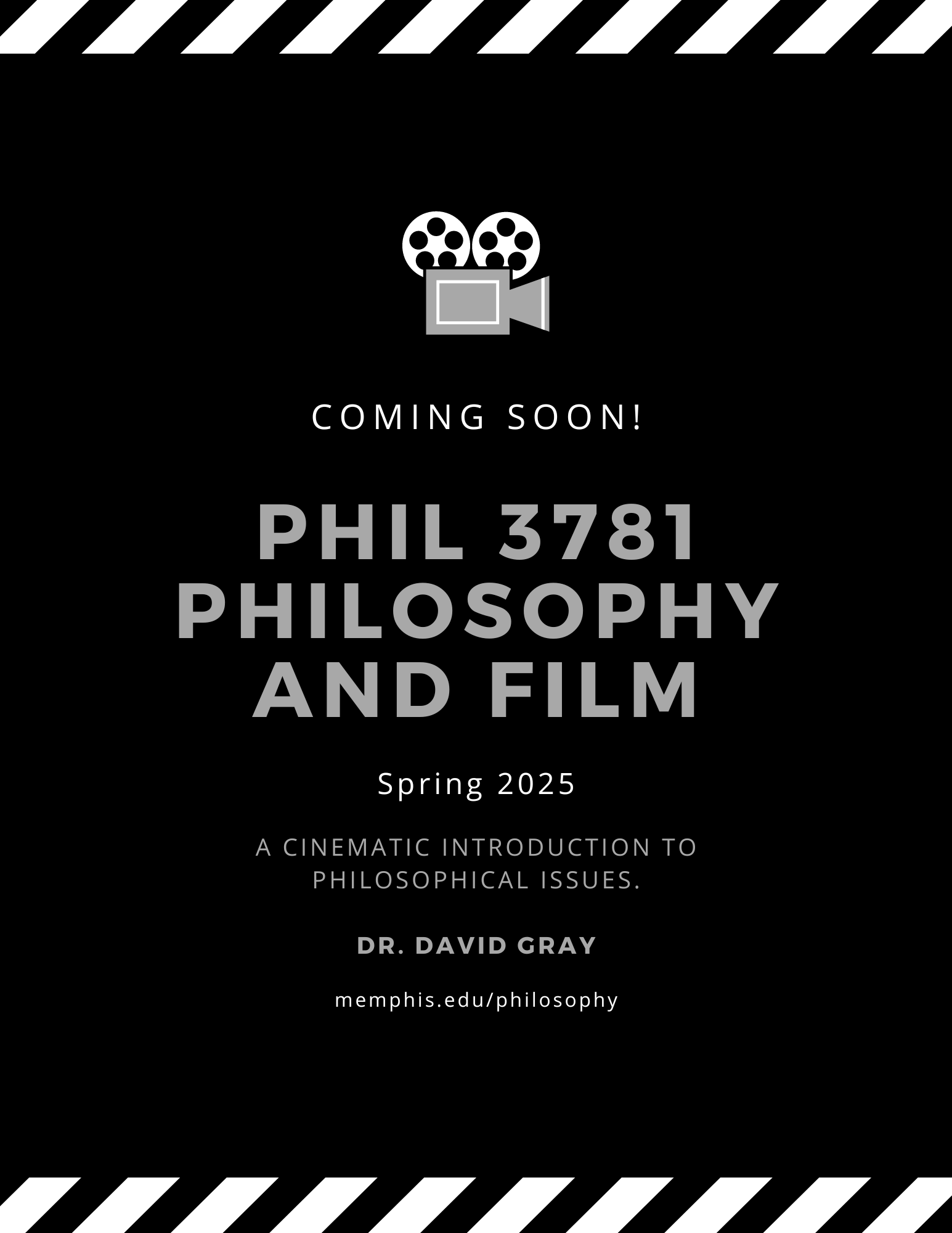
CRN 12105
Wednesday
2:30-5:30pm
David Gray
Course Description
How can cinema introduce us to philosophical issues? What philosophical issues do films themselves raise? This course will use film to introduce topics such as truth and relativism, aesthetic judgment, time travel, just war theory, and time travel. We will also investigate the standards we use to judge film, what film techniques make films effective, and how films can question the nature of cinema. Movies and clips will be shown for the first part of class, followed by discussion. Films include 12 Monkeys, The Haunting of Hill House, Blade Runner, Roshomon, Memento, Do the Right Thing, and others.
PHIL 3806-M50 - The Ethics of AI and Big Data 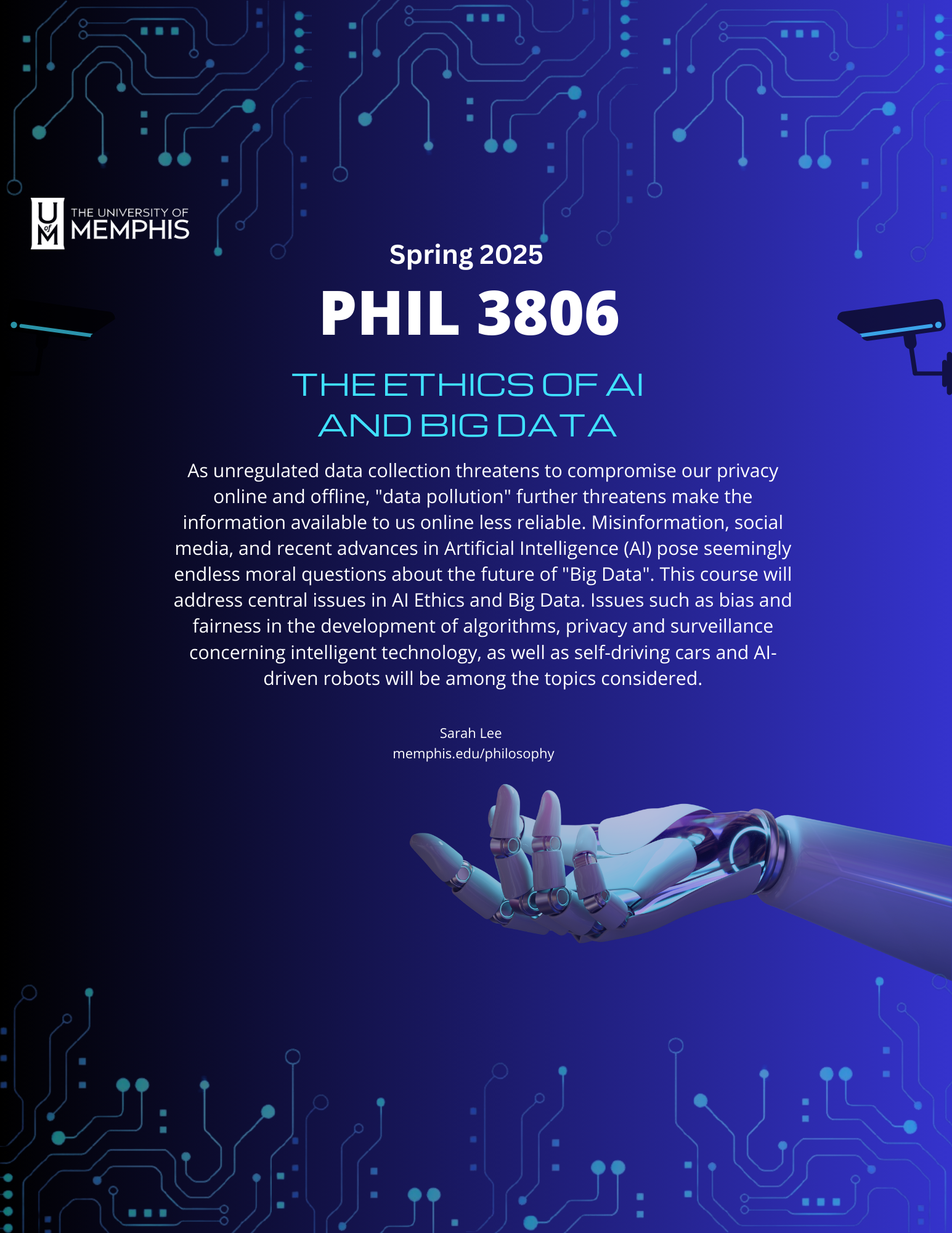
CRN 29402
ONLINE
Sarah Lee
Course Description
As unregulated data collection threatens to compromise our privacy online and offline,
"data pollution" further threatens make the information available to us online less
reliable. Misinformation, social media, and recent advances in Artificial Intelligence
(AI) pose seemingly endless moral questions about the future of "Big Data". This course
will address central issues in AI Ethics and Big Data. Issues such as bias and fairness
in the development of algorithms, privacy and surveillance concerning intelligent
technology, as well as self-driving cars and AI-driven robots will be among the topics
considered.
PHIL 4801 – Special Topics in Philosophy: Radical Evil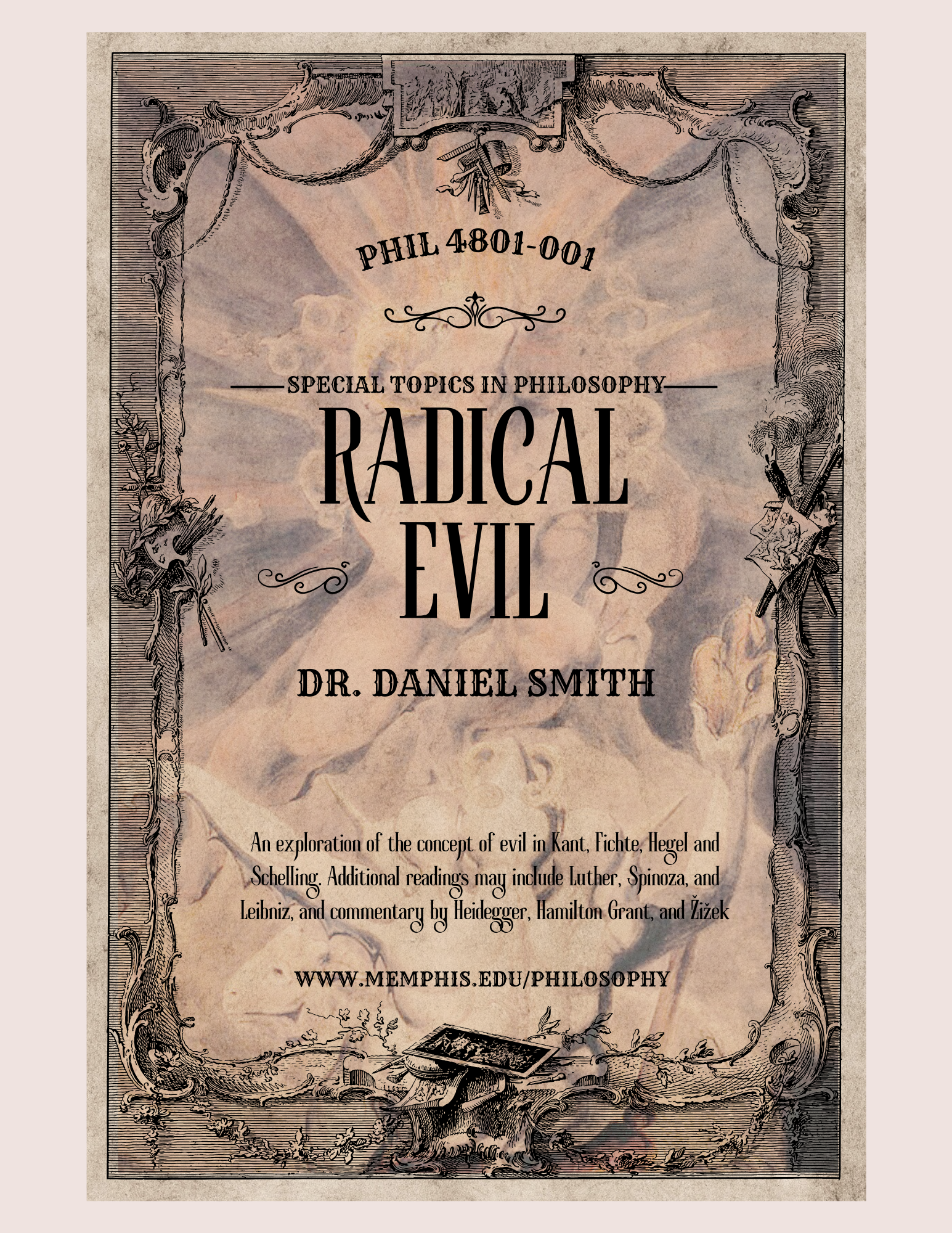
CRN 30319
Monday
6:00 - 9:00 pm
Daniel Smith
Course Description
An exploration of the concept of evil in Kant, Fichte, Hegel and Schelling. Additional
readings may include Luther, Spinoza, and Leibniz, and commentary by Heidegger, Hamilton
Grant, and Žižek
PHIL 4421/6421 – Philosophy of Mind (prerequisite PHIL 1101, 1102, or 1611)
CRN 21386
Thursday
2:30-5:30pm
Shaun Gallagher
PHIL 6421 - Philosophy of Mind
CRN 21386
Thursday
2:30-5:30pm
Shaun Gallagher
PHIL 7301 - Seminar in Modern Philosophy
CRN 18995
Monday
2:30-5:30pm
Michael Monahan
PHIL 7414 - Seminar in Metaphysics
CRN 12127
Tuesday
6:00-9:00pm
PHIL 7514 - Cognitive Science Seminar
CRN 21695
Wednesday
2:30-5:30pm
PHIL 7541 - Social/Political Philosophy
CRN 18167
Tuesday
2:30-5:30pm
Lindsey Stewart

